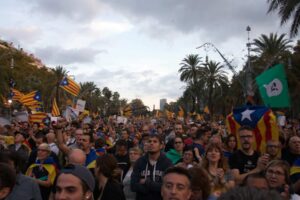by The Cowl Editor on October 24, 2019
National and Global News
by Kyle Burgess ’21
News Co-Editor
The city of Barcelona, Spain erupted into flames on Friday night as local protestors responded to the recent arrests of pro-independence movement leaders by the Spanish government.
Participants in the riots did more than simply voice their displeasure at their current political situation, resorting to burning garbage bins and hurling objects at police forces long into the evening to ensure that they were heard and seen.
Many of these protestors had been out demonstrating since Monday after nine politicians were handed prison sentences spanning nine to 13 years for their involvement in a similar independence movement two years ago.
Former Vice President of Catalonia Oriol Junqueras received the longest sentence of 13 years in addition to being banned from public office for the same length of time under charges of “sedition and misuse of public funds.”
Catalonia itself, the region of Spain in which Barcelona is located, shares a long and complicated history with the central Spanish government in Madrid. The 7.5 million people who call the region home identify with a different cultural background than their Spanish counterparts, speak their own language called Catalan, and at one point were even their own separate kingdom.
This all changed, however, when the Queen of Aragon gave her hand in marriage to the count of Barcelona back in the 12th century, bringing about the Kingdom of Aragon.
The name “Aragon” would be familiar to American history students as King Ferdinand, one of the chief patrons of Christopher Columbus’ famous 1492 voyage along with his wife, Isabella, came from this region as well.
The marriage of Ferdinand and Isabella also involved a political marriage of Aragon/Catalonia into Castile to form the modern country of Spain. Since then, however, Catalonia has felt it is constantly on the short end of the stick, bearing heavy tax burdens to this day because of the wealth that Barcelona brings in as a port city.
Such financial impositions were only compounded during the reign of dictator Francisco Franco from 1939-1975 in which the region lost the special autonomy it had enjoyed since the days of Columbus, although this was restored following his death.
Now, Catalans feel that the same oppression they experienced under Franco has returned in Madrid and are looking for a way out of their union with Spain altogether.
The result was a region-wide referendum back in 2017 with the majority of Catalans voting to declare independence that October. Their declaration was promptly nullified by the Madrid government who sent in riot squads to qualm street protestors and restore order, a strategy they mirrored this past Friday.
The images of burning dumpsters and police shooting tear gas into crowds of protestors have stirred much attention across the globe towards the Catalan independence movement, with local and national politicians addressing an international press.
“This cannot continue. Barcelona does not deserve it,” Barcelona Mayor Ada Colau told reporters in reference to the nearly 500 injuries and 150 arrests made over the course of the week.
At the same time, the Spanish government has insisted that the Catalan regional government make stronger efforts in condemning the riots. Spanish Minister of the Interior Fernando Grande-Marlaska claimed, “We have gone five days in which there has not been a firm condemnation of violence.”
Catalan Interior Chief Miquel Buch has asserted that “the images of organized violence during the night in Barcelona have overshadowed the half a million people who demonstrated in a peaceful and civic manner to show they rejected the verdict [against independence].”
Back home in Friartown, the Center for Global Education along with Providence College’s Office of Public Safety is adhering to the constructive advice provided by the U.S. Department of State to ensure the well-being of all 260 PC students studying abroad both in Barcelona and across the globe in other hot spots such as Santiago, Chile and Quito, Ecuador.
They have worked directly with study abroad programs such as CEA, CIEE, and IES in permitting students to miss class without being penalized should they feel uncomfortable travelling in the current environment. Students are also constantly updated with maps of the city showing where demonstrations are set to take place in addition to being placed on a “call list” through which the U.S. embassy can provide important updates as needed.
“It was a challenging 96 hours,” Dean of Global Education Joe Stanley and Assistant Dean of Global Education Grace Cleary admitted in referring to the developing outbreaks Friday, “but we have strong health and safety policies in place. Most of the demonstrations have been peaceful with fringe groups burning dumpsters and causing trouble, but we have been in constant contact with stakeholders such as the Office of Public Safety, General Counsel, Public Affairs and Communications, Dean of Students, and our academic centers abroad. We also rely on information from our partners overseas, as well as the Department of State and the Overseas Security Advisory Council.”
“I do feel safe here as most of the protests have been nonviolent,” explained Jeff McCormack ’21, who is currently studying abroad in Barcelona. “The school has been in contact with us students here in Barcelona and has contacted our families as well. We are constantly being updated by our program, the U.S. embassy, and PC as to what demonstrations are occurring.”
In addition to disrupting the regular morning commute for many Barcelona natives and PC students alike, these protests have also directly impacted the highly-anticipated El Clasico showdown between FC Barcelona and Real Madrid, with league officials postponing the game until the situation between Catalonia and Madrid is resolved.
